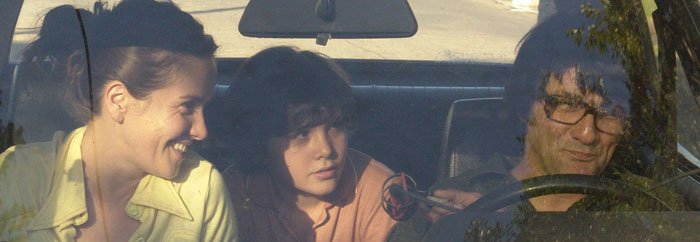
Infancia Clandestina (Clandestine Childhood)
24 February, 2013Infancia Clandestina (Clandestine Childhood), directed by Benjamín Ávila, is set in Argentina during the time of the Dirty War, the period in the 70s in which state-sponsored terror sought to crush all dissent. The story is based on real events.
Disintegration
The action starts in Argentina in 1975. The Peronist revival has collapsed and its rivals for power – the military and paramilitaries – are prepared to use any means to consolidate their position. The enemy is within and in this particular instance it comes in the form of the Peronist-leaning, Montoneros.
The tone is set by the opening scene in which Cristina (Natalia Oreiro), using the alias of Charo, and Horatio (César Troncoso), alias Daniel, return with their son Juan (Teo Gutiérrez Romero), alias Ernesto, to their apartment only to be targeted in a drive-by shooting. The scene, in which Horacio is wounded, is transformed briefly into a continuous narrative cartoon as if to make sense of it from a child’s perspective. This becomes the theme of the film and a repeated motif as 12-year-old Juan/Ernesto takes on the role as the medium of the story.
Exile and return
Time moves on and the action flits briefly to Cuba and the family’s return from exile via Brazil. When we next meet Juan/Ernesto he is coming over the border – with his surrogate parents, Carmen (Mayana Neiva) and Gregorio (Douglas Simon) – from Brazil the year after Argentina’s glorious World Cup win (1979). From here on he must assume the identity of Ernesto, first as a Brazilian and later at school as someone from the provinces, a Cordobese. “Safely” back on the Argentine side of the border, Juan/Ernesto is transferred into the charge of Uncle Beto (Ernesto Alterio). At the same time the leaders of the Montoneros – including Juan/Ernesto’s parents – are returning from exile in Chile to take on the military junta in a counter-offensive.
Theory and practice
Back in Buenos Aires and newly reunited with his parents, the tale ought then to follow a tension-ridden life where everyone has an alias and you never know whom you can trust, whether you’ll be stopped by the police, tortured or “disappeared”. That’s the theory at least. The reality is somewhat different. Only the aliases turn up. The film is unerringly flat – and it’s not just the 2D. There is a strange absence of genuine emotional intensity, despite the odd argument between the brothers Beto and Horacio and the grandmother, Amalia (Cristina Banegas) and her daughter, Cristina.
A cameo in chocolate
Ernesto Alterio (Beto) is the only character made flesh. Indeed, without his crass proclamation to Juan/Ernesto that “Nothing in the whole world beats chicks” or his tutelage on how to eat a Mani chocolate covered peanut and get the girl, there is little to get excited about. When Beto is killed, part of the film dies with him. There wasn’t too much any of the actors could have done with so little pace. At no time do you get the terrible sense of paranoia and angst that accompanies life in a police state; the sheer tension of just being. A few furtive looks over the shoulder just doesn’t wash. They all go through the motions but they don’t carry any real sense of fear or menace.
Romantic intermission
There is a brief respite from the lack of tension but it isn’t relieved by Juan/Ernesto’s pre-pubescent hankering for classmate, Maria (Violeta Palukas). When first Beto and then Horacio are killed in police shootouts, gravitas is nowhere to be seen. Juan/Ernesto hears of his own father’s death live on TV, yet the whole thing has an unreal quality. This is pursued later, with similar results at the denouement, when Vicky (Juan/Ernesto’s infant sister) and Cristina “disappear”. Similarly, the use of the cartoon device and Juan/Ernesto’s interpretations of events – real and imagined – do little to add to the whole. They appear as lazy abbreviations and are a poor substitute for properly constructed dramatic tension.
The man from uncle
In the end the only thing the film offered was the unshakeable belief that Tio Beto was a very good uncle; a case of Uncle Buck meets the Montoneros.
It’s a shame that such obviously talented actors had so little with which to work. There was more emotional intensity packed into the dedication at the end than anything the film could muster. Here goes: “In memory of my mother, Sara E. Zermoglio, missing since October, 13, 1979, to my brothers, my father, my children, grandchildren and militants and all those who kept the faith.”
Follow Sounds and Colours: Facebook / Twitter / Instagram / Mixcloud / Soundcloud / Bandcamp
Subscribe to the Sounds and Colours Newsletter for regular updates, news and competitions bringing the best of Latin American culture direct to your Inbox.

